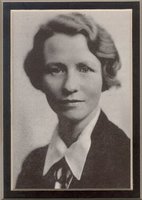Death to peace, happiness, and voidfilling Gospel
 Case Study: Edna St. Vincent Millay
Case Study: Edna St. Vincent MillayI love er' but Edna's poetry is a perfect example of the appropriate response to the gospel message that says: Jesus will fill the void in your heart; Jesus died to give your life purpose; Ask Jesus into your heart and he will comfort you and give you joy. WAIT! Are these things true? YES! Is this the Gospel? um...NO. The gospel can be found in Romans 3:21-26. Here is the featured poem:
Spring
To what purpose, April, do you return again?
Beauty is not enough.
You can no longer quiet me with the redness
Of little leaves opening stickily.
I know what I know. 5
The sun is hot on my neck as I observe
The spikes of the crocus.
The smell of the earth is good.
It is apparent that there is no death.
But what does that signify? 10
Not only under ground are the brains of men
Eaten by maggots.
Life in itself
Is nothing,
An empty cup, a flight of uncarpeted stairs. 15
It is not enough that yearly, down this hill,
April
Comes like an idiot, babbling and strewing flowers.
Analysis
To start with, April (spring) is the time of the year (at least where I live) when everthing comes back to life after a (much too long) winter. Here, the poetic voice claims that the beauty and hope of spring "no longer quiet[s]" her. This poem has strong religious resonances. Her claim about Spring's lack of power is a metaphor for religion's promise of life after death. Spring represents for her the cruel empty promise (in her eyes) that is symbolized by the "opening of leaves." Lines 6-9 show the apparent hope that is in nature. This is not enough to take away what "she knows" (line 5); that we live in a rotting world.
 This poem was written in 1921 only a few years after the First World War. Never before had so many died in such a violent and abrupt fashion. It was now clear that humans were capable of completely wiping themselves out. In a world where "life in itself is [now] nothing," she says that religious promises of future bliss are merely "idiotic" and "babbling." It is not unlikely that Edna was familiar with a "gospel" that said that God can comfort you and give you meaning and purpose in these hard times. Maybe she even "tried on Jesus" for a time. But when she found that all of her pain and sorrow still remained, it was an easy choice to reject the gospel.
This poem was written in 1921 only a few years after the First World War. Never before had so many died in such a violent and abrupt fashion. It was now clear that humans were capable of completely wiping themselves out. In a world where "life in itself is [now] nothing," she says that religious promises of future bliss are merely "idiotic" and "babbling." It is not unlikely that Edna was familiar with a "gospel" that said that God can comfort you and give you meaning and purpose in these hard times. Maybe she even "tried on Jesus" for a time. But when she found that all of her pain and sorrow still remained, it was an easy choice to reject the gospel.I previously posted two of her other poems called, 'First Fig,' and 'Grown-Up.' 'Grown-Up' asked the question, "What are we living for?" "Are we living for some future time that we hope will be better?" Parenthood, which could also stand for the afterlife, is here shown to be a big disappointment. Her answer is found in 'First Fig." Burn the candle till she burns out 'cause yuh only get one. Edna's burnt out in 1950 and then she went to meet her creator.
Jesus came to appease the just wrath of God on sin for those who trust in him. The result of this is a transformation that necessarily brings hope and peace (Romans 5:1-5).
Jesus came to appease the just wrath of God on sin for those who trust in him. The result of this is a transformation that necessarily brings hope and peace (Romans 5:1-5).
Law ---> Grace
LAW ---> GRACE
Serve your King


1 Comments:
Cool blog, interesting information... Keep it UP camping equipment Colored paper wedding invitations Honda vtr sp1 model free sex movie http://www.grundy-rain-jackets.info meridia gay shorts Paygo answering service survey Best sportsbooks vegas strip cialis for order Nudedrunk orgy partying Meridia powercycle electric games brakes volvo
Post a Comment
<< Home